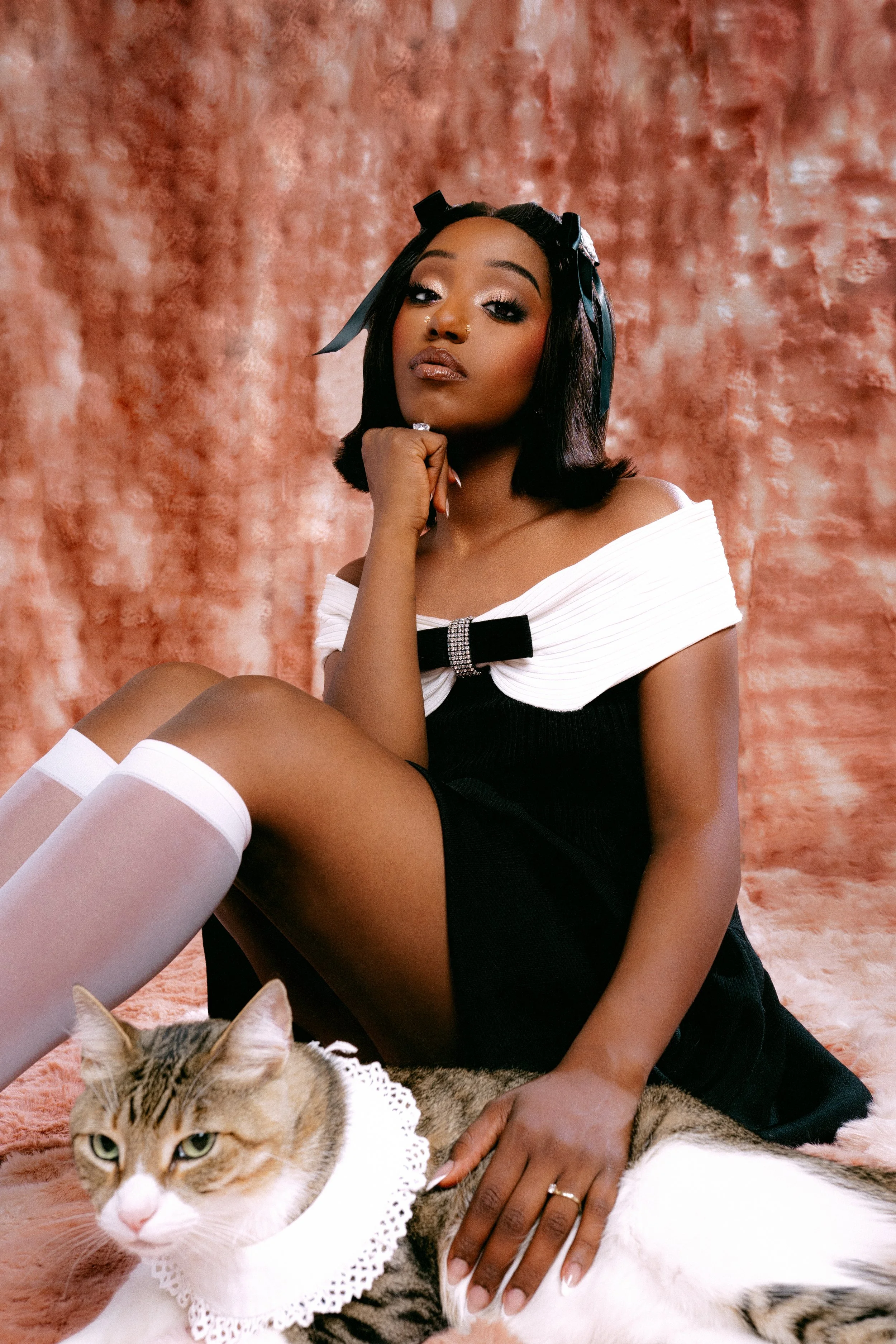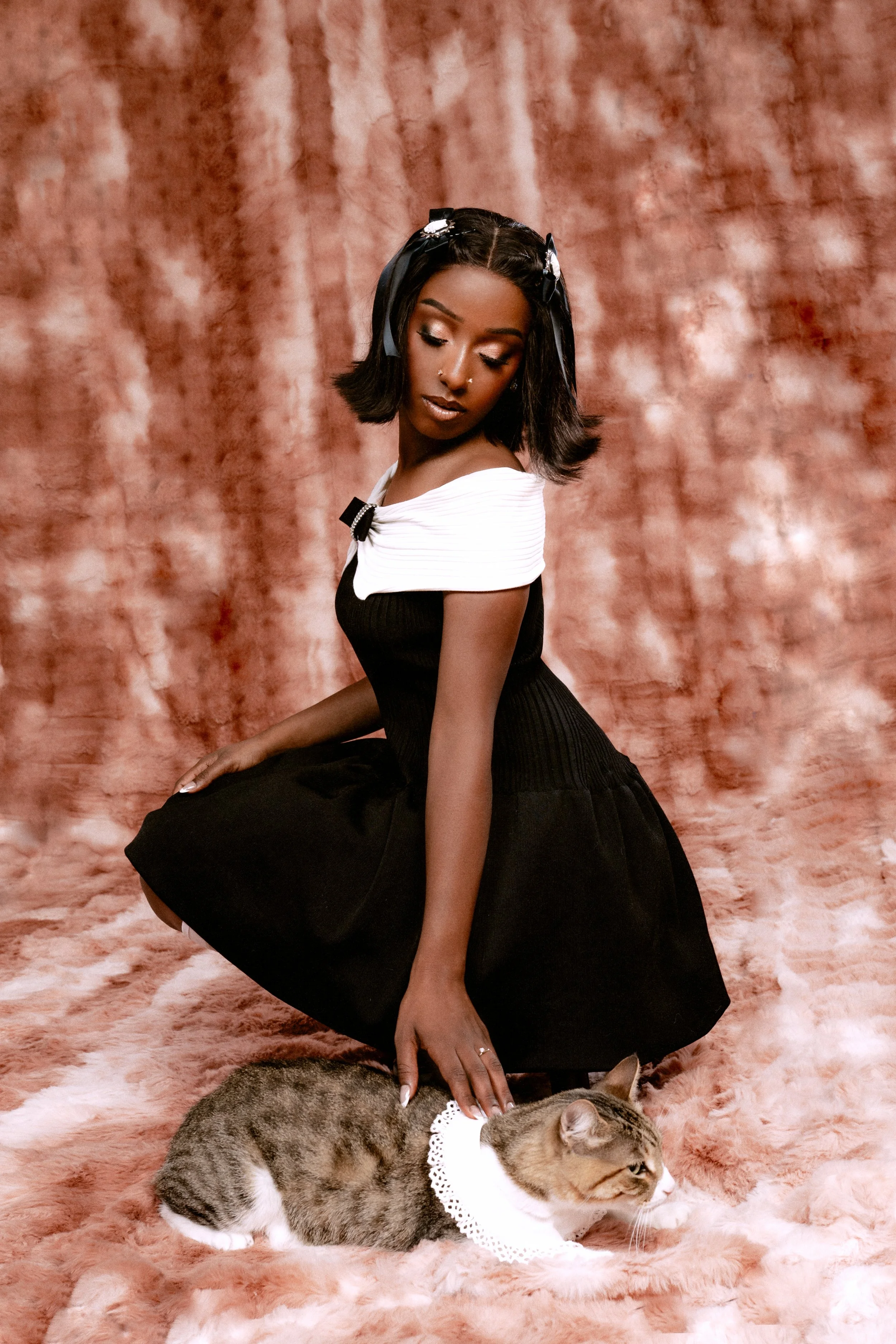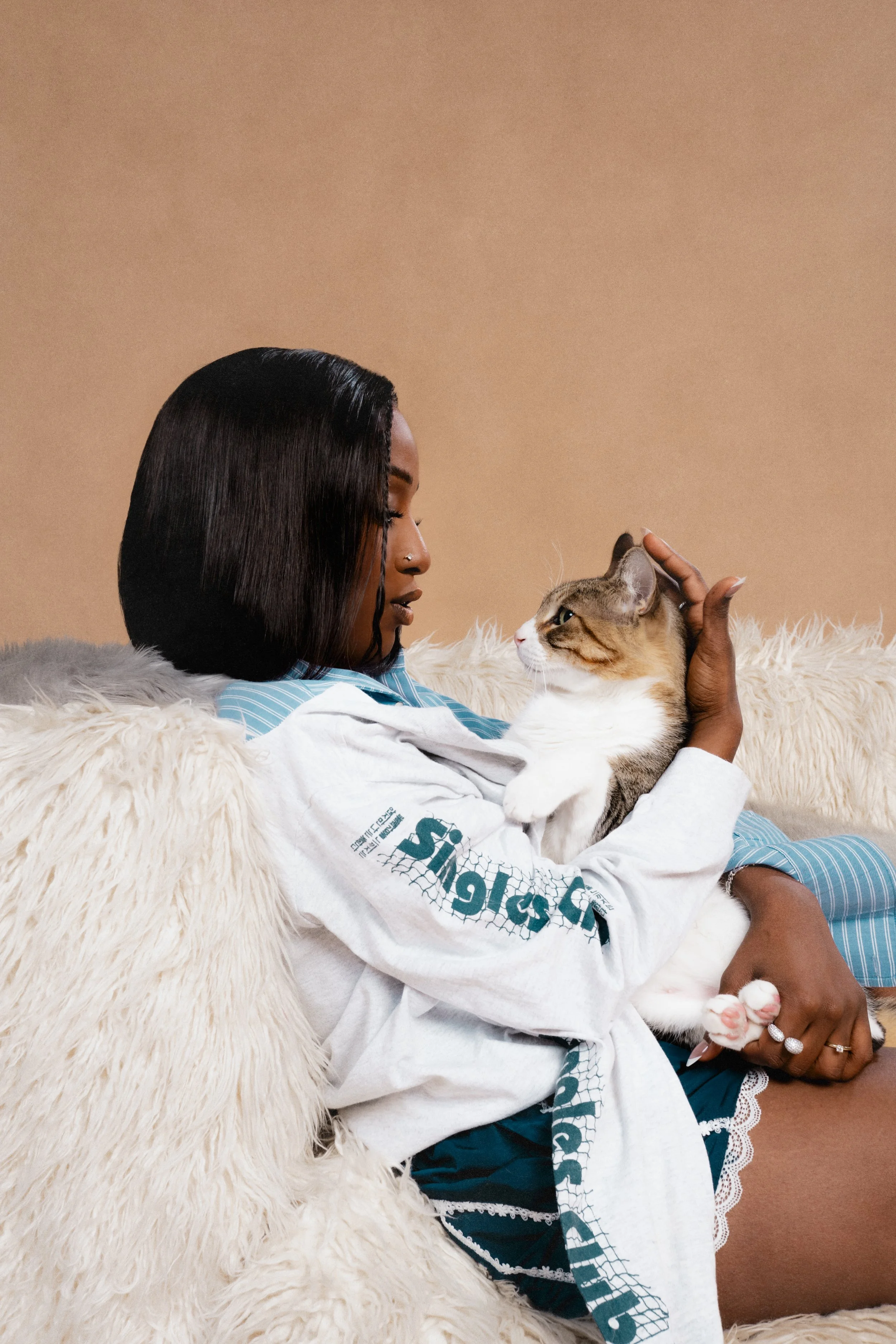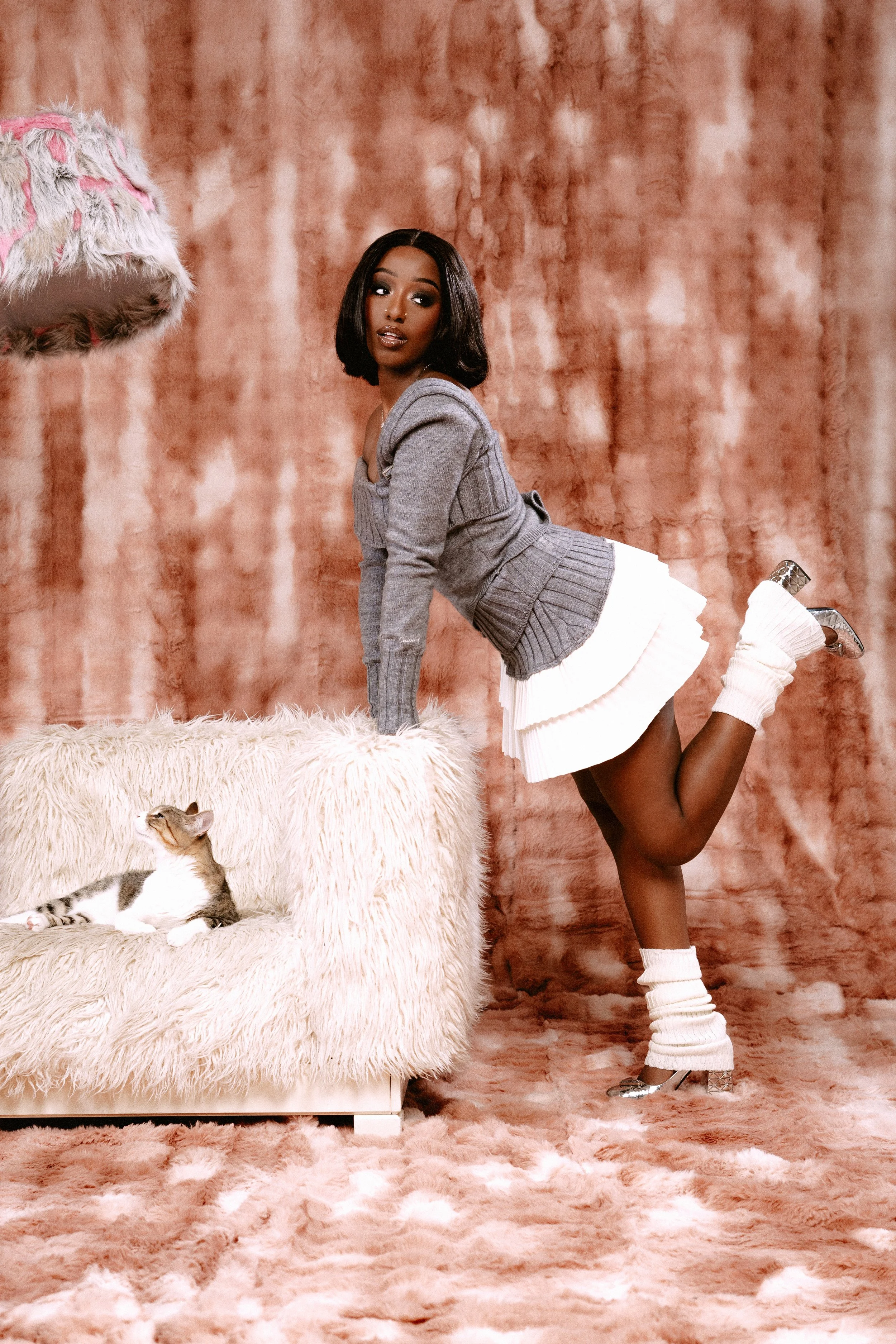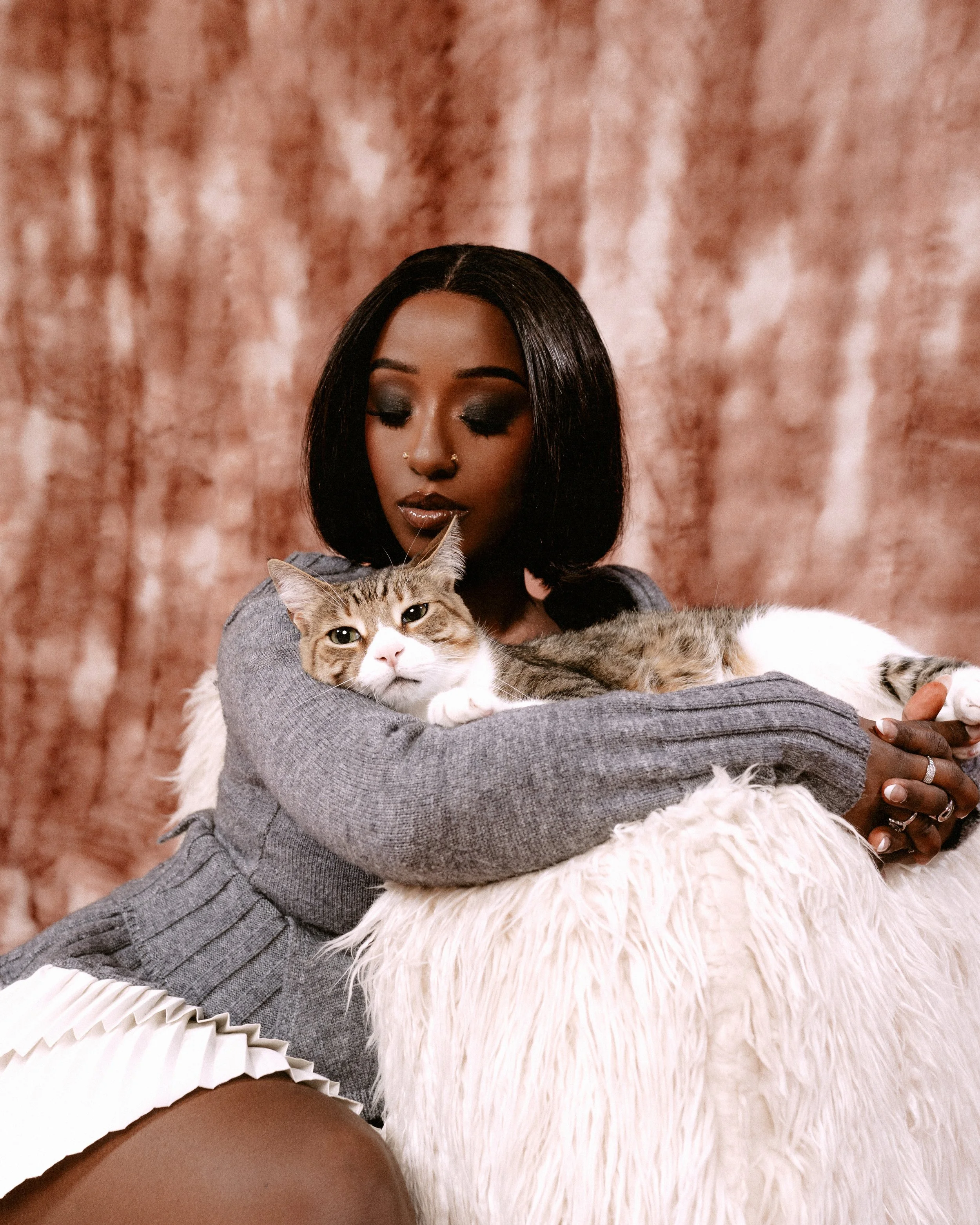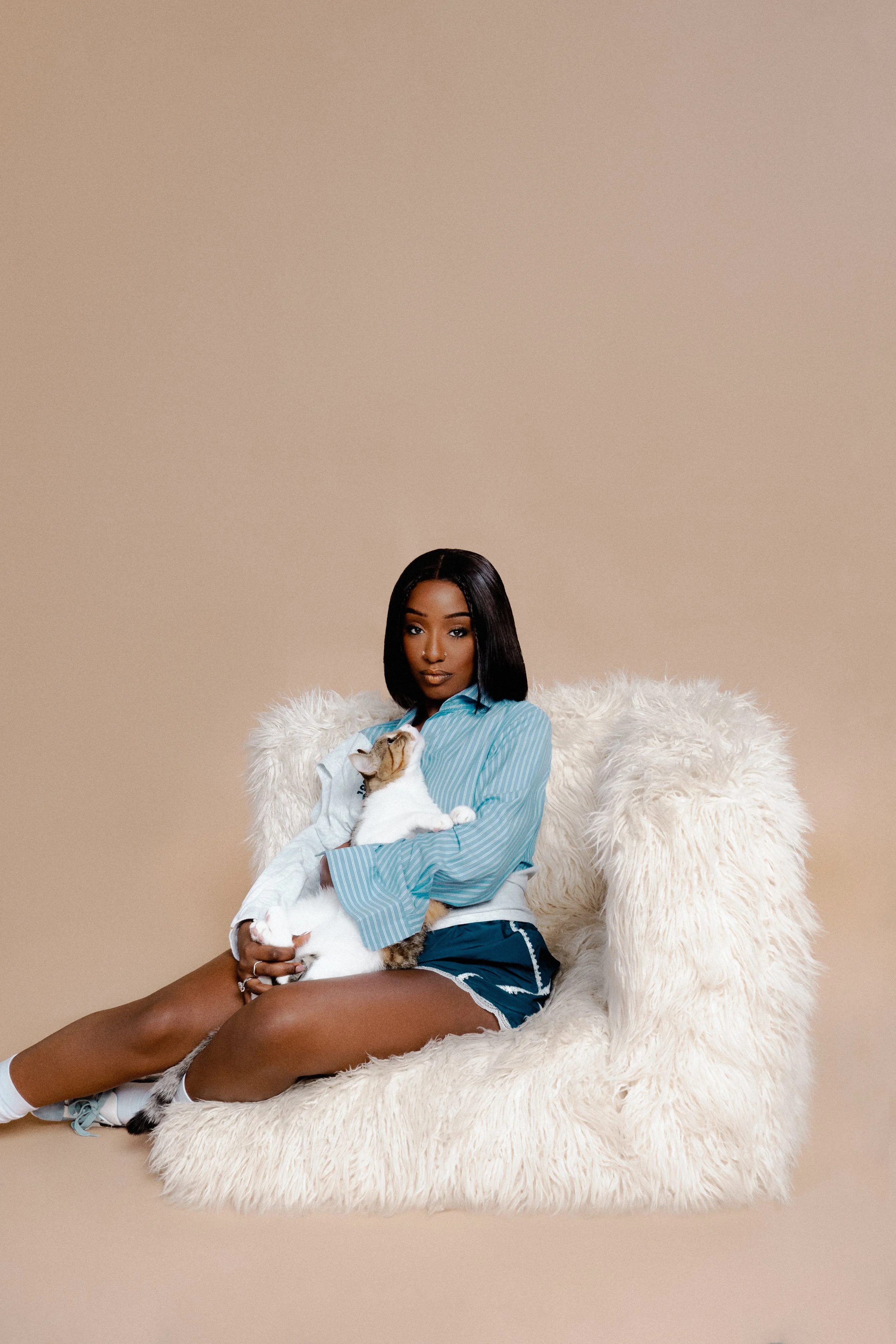Alemeda on Being a Cat Mother, Making The Perfect Hate Song and Why She Won’t Stick to One Lane of Music
Words: Charis McGowan | Photographer: Kirt Barnett | Stylist: Abby Gordon | MUA: Manuel Espinoza | Hair: Danni Bee | Video: Camille Mariet | Set: Noah Fence & Kate Altman
Make it stand out
Alemeda is giving me cat tips — “did you try the plug-in pheromone?”. Her cats, Mr. Cinnamon and Mr. Truffles, aren’t blood brothers but cuddle as if they had been together since the womb. My cats are more into hissing spats than Instagrammable snuggles. Mr. Cinammon is the only feline present at Polyester’s shoot as Mr. Truffles is a rescue and gets spooked easily. Cinnamon’s happy to pose and follow his mother obligingly, “I could bring him on tour and he’d be fine” she says.
The 24-year-old Sudanese-Ethiopian singer is remarkably chill given that she’s just released her debut EP, FK IT, and has recently joined the likes of SZA and Kendrick Lamar on the rap label Top Dawg Entertainment. Despite massive strides in her career, she remains unfazed by the conventional celebrity way of life — she prefers to hang out with her cats and stick to her Muslim values.
“No drinking, no drugs, no partying,” she says. ”The industry doesn't align with the values of Islam, but I don’t indulge in it. I write my songs, I perform and I go home.”
Full name Rahema Shifa Alameda, the singer spent her childhood between Arizona and Addis Ababa after her mother immigrated to the US. She wasn’t allowed to listen to pop music in her mum’s strict Muslim household but still found ways to discover childhood favourites like Coldplay and Hannah Montana. Despite a childhood being told that religion was at odds with pop music; Alemeda is carving her own path in the industry — able to balance faith with the heights of fame. “Now is a great time to be yourself. Labels respect artists. I have full control over my image, my videos. So why would they not respect my religion?”
Top: Serpenti | Shoes: Jessica Rich | Hair accessories: Frou York | Bracelet: Sterling Forever | Ring: Sterling Forever
Despite her low-key lifestyle, Alemeda’s music is anything but reserved. “I know my fist wants to meet your face / I hate you / I hate your face / I hate you a little more every day” she seethes on moody grunge anthem ‘I hate your face’; or ‘the only way you’ll change, only way you’ll grow / Is if you’re six feet deep down a god damn hole’” she muses on the indie-pop single ‘I already dug your grave’.
“Now is a great time to be yourself. Labels respect artists. I have full control over my image, my videos. So why would they not respect my religion?”
Alemeda’s first forays into music were grounded in pop-rock — it’s what she listened to as a kid, and is the strongest musical influence on FK IT. Yet her breakthrough hit ‘Gonna Bleach My Eyebrows’ is entirely different. Inspired by PinkPantheress’ 2022 breakout, Alemeda wanted to try her hand at some UKG. “I didn’t think that would be the one to blow up. I thought it’d just be a cute little [song],” she laughs. “But I think [UKG and DnB] are under the alternative umbrella. I’ve chosen alternative rock to be my sound, I wanna explore within it and not just [use] straight-up guitars.”
Dress: Self Portrait | Shoes: Jeffrey Campbell | Hair accessories: Frou York | Ring: Sterling Forever | Rings: Sif Jakobs
Despite flexing in different genres, the singer consistently commands a laid back, melodic flow across her songs, pairing breezy beats with spitfire lyrics. “I love hateful songs on the happy beats, it’s so sarcastic,” she says. “I’m someone that laughs through bullshit and pain.”
Her songwriting is deeply honest—what she’ll say in a song, she’ll say to someone’s face.
Shorts: Edikted | Shoes: Jeffrey Campbell | Rings: Sif Jakobs
“I was an extremely angry individual, but since making songs about my actual experiences I’d say I’d calm down,” she notes. Out of the eight tracks on FK IT, only one song, ‘First Love Song’, veers from the topic of hate.
“Writing a hate song is so much easier for me. I have more experience with hatred than love, which comes with growing up in an African, immigrant and refugee household. Most people who lived through that don’t experience physical or verbal love,” she adds, matter-of-factly.
I remark that that is incredibly sad. She softly chuckles; “yeah, it is.”
Top: Sweet Chilling | Skirt: Sweet Chilling | Shoes: Prada | Necklace: Sif Jakobs
Given her personal hardships, she’s intensely conscious of giving back to people in vulnerable situations. “I was thinking about world crisis problems at the age of five, like how we gonna solve hunger? Kids [in Ethiopia] are forced to grow up quicker, people literally don’t have food,” she says. “I’m very much a humanitarian activist, I want to go back to my country and help people.”
“I was an extremely angry individual, but since making songs about my actual experiences I’d say I’d calm down,”
Alemeda isn’t interested in making political or protest music — she’d prefer to work on concrete humanitarian projects — but she does say her new music will be markedly different. She penned most of the songs on FK IT years ago, and now she’s excited to move on to a new chapter, “the hatred is still valid, but I’m less hateful. The way I speak about things is more mature.”
She performs to her cats all the time, they are her hardest audience. Mr. Truffles runs away while Mr. Cinnamon stares, unimpressed, “You know that look like we are stupid? That kind of thing.” Even so, she is more comfortable with them than with anyone else.
She’s thinking about penning a song for them to shift her away from her go-to hate songs: “I think that would be the best love song, because I really do love them.”

